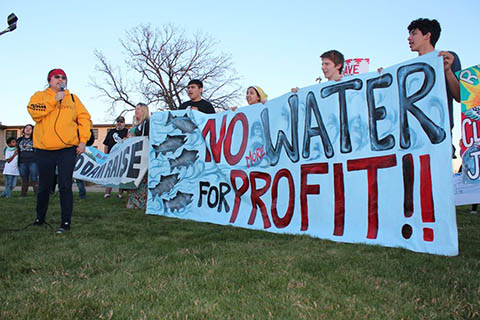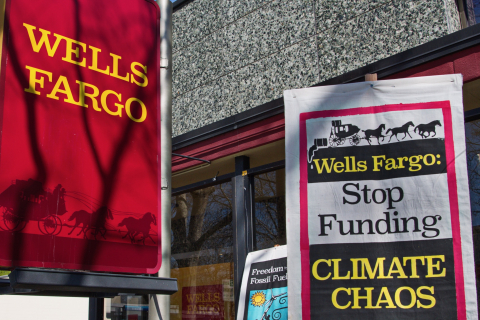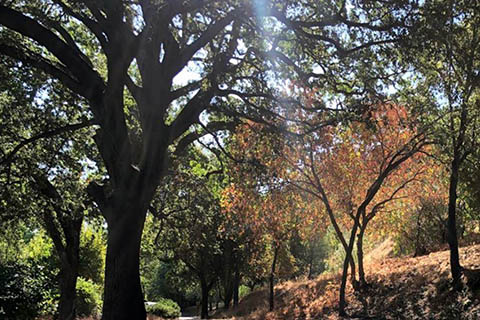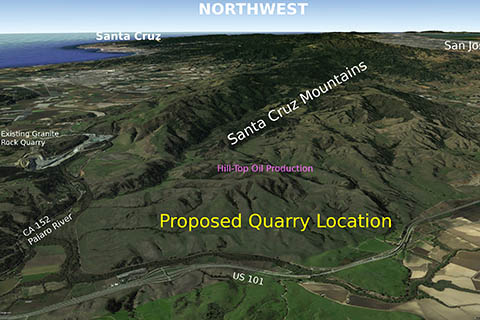Feature Archives
Wed Apr 22 2020 (Updated 04/24/20)
Wood Pellet Plant in Mendocino County Threatens Public Health
On April 3, KPFA’s Terra Verde radio program interviewed community activists from Mendocino County. Host Gary Hughes spoke with Polly Girvin and Maria Gilardin about the threats posed by a wood pellet processing facility in Calpella, six miles north of Ukiah. Polly and Maria are members of Social, Environmental and Indigenous Justice (SEIJ), an affinity group waging a campaign to protect rural and indigenous communities from pollution emitted by Mendocino Forest Products and their wood pellet fuel plant.
Wed Apr 8 2020
California Approves New Fracking During COVID-19 Pandemic
On April 3, in the midst of the COVID-19 pandemic and after a nine-month moratorium on new fracking operations, California's Department of Conservation approved 24 new fracking permits in Kern County, the center of the oil industry in California. Fracking opponents strongly condemned the approval of new fracking permits at a time that the state is virtually shut down, and people are dying everyday from the COVID-19 virus.
On February 28, the Westlands Water District signed a permanent water repayment contract with the Bureau of Reclamation to provide Central Valley Water Project water in perpetuity to the growers in the powerful, politically-connected water district on the west side of the San Joaquin Valley. Barbara Barrigan-Parrilla, executive director of Restore the Delta, stated, “At a time of unprecedented climate changes and droughts we should not be circumventing the law and promising by federal contract far more water than actually exists to one large irrigation group at the expense of others.”
Sat Feb 29 2020 (Updated 03/03/20)
Extinction Rebellion Action Closes Chase Bank
Approximately 300 protesters descended on the Chase branch in Santa Cruz on February 28 to demand an end to the bank's financing of the fossil fuel industry. Five people stood in front of the teller windows to stop all banking transactions. Protesters successfully shut down the bank for the remainder of the day. Meanwhile, outside the bank, demonstrators sang and danced while offering water, cookies, chair massages, blankets and throw pillows. As rush hour traffic drove by, motorists honked their horns in support while creative participants chalked the walkways outside the bank with many messages.
Fri Feb 28 2020
Protesters Tell Wells Fargo "Quit the Dirty Energy Business"
In a two-day action, demonstrators called on Big Oil’s largest lender, Wells Fargo, to halt its financing of fossil fuels and invest instead in clean energy solutions to the climate crisis. They took their protests to bank branches in San Jose and Mountain View. On February 20 in San Jose, about twenty demonstrators marched into the Wells Fargo branch. They quickly deployed banners and signs throughout the bank’s customer area, then sang and chanted the message that Wells Fargo’s $172 billion a year financial support of the fossil fuel industry is destroying our environment. The following day, protesters targeted a Mountain View branch.
Thu Feb 27 2020 (Updated 02/29/20)
Saranap Development Will Destroy Old-Growth Oak Trees
On February 25, the Contra Costa County Board of Supervisors doomed an old-growth grove of oak trees, and an easement trail, by deciding in favor of real estate moguls Tambri Heyden and David Montalbo. Despite opposition, the developers have been given the green light to proceed in the unincorporated community of Saranap, located between Lafayette and Walnut Creek in Contra Costa County. In their way stands a grove of old-growth oak trees. Also, at issue is the possibility of Indigenous remains and cultural artifacts on the site. However, it is not too late to stop the construction if people act up and speak out.
Mon Feb 24 2020 (Updated 02/25/20)
Campaign to Protect Juristac Gains Support of Santa Cruz City Council
On February 11, the Santa Cruz City Council unanimously passed a resolution supporting the efforts of the Amah Mutsun Tribal Band to preserve Juristac as open space in perpetuity and to regain access to their cultural and spiritual sites at Juristac. The Council action was in response to the proposal by the Debt Acquisition Company of America to develop on the sacred territories of the Amah Mutsun community. The proposed Sargent Quarry Project seeks to impact 320 acres of this land by developing a 14-acre processing plant, 200-foot open pit quarry site, a 1.6 mile long conveyor belt, and a 30 foot wide access road.








